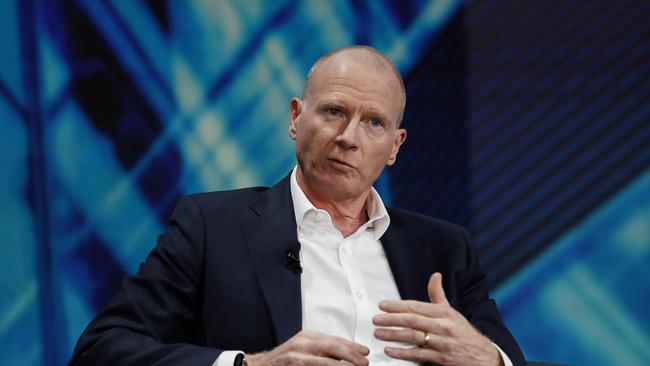Love Island and The Simpsons – how Cochlear will lift its profit 10pc to $305m this year
Hearing implants are becoming more mainstream, even featuring on The Simpsons and Love Island. Cochlear CEO Dig Howitt plans to ride the wave.

Cochlear expects its net profit to rise as high as 10 per cent, up to $305m, this year as the hearing implant titan bounces back after two-and-a-half pandemic-plagued years and even earns a cameo on The Simpsons.
The forecast comes as the company delivered record revenue — which jumped 10 per cent to $1.65bn in the year to June 30 — as demand for its acoustic implants and sound processor upgrades returned to pre-pandemic levels across all regions.
But chief executive Dig Howitt has warned “intermittent” bans on elective surgery are set to continue as fresh Covid-19 spikes emerge, limiting hospital capacity.
The pandemic had disrupted the company, with its hearing implant installations lumped in with a raft of elective surgery cancellations across the globe. This has been particularly concerning for children needing an implant, which if installed as early in life as possible, leads to a greater hearing outcome.
Last financial year, the company’s statutory net profit sank 11 per cent to $289.1m. This included one-off gains after tax of $12m. On an underlying basis, net profit jumped 18 per cent to $277m.
Mr Howitt said there was pent-up demand for hearing implants, with Cochlear’s flagship product gaining greater awareness, particularly in the US where the company has helped original Incredible Hulk actor Lou Ferrigno hear again.
“There was a contestant on Love Island who also had a Cochlear implant and The Simpson has also featured Cochlear implants,” Mr Howitt said, referring to an episode of the hit cartoon series in April during which it featured American Sign Language for the first time.
But Mr Howitt isn’t planning on collecting any royalty payments from TV executives. “We’re just happy to sell the implants.”
“Awareness is growing and it's really important. It’s our biggest issue in people not understanding the options that they have available for them when they struggling here with hearing aids.”
Cochlear shares jumped 2.4 per cent to $219.41 on Friday against a flat broader sharemarket.
It will pay a dividend of $3 a share, an 18 per cent increase on last year, on October 17.
Mr Howitt said this year’s profit guidance – a 5-10 per cent increase to $290-305m – anticipated strong sales growth and an underlying margin of about 18 per cent. He said it did not factor another “material disruption” in pandemic-related surgery restrictions.
“We expect trading conditions to progressively improve across the year, with intermittent Covid-related hospital or region-specific elective surgery restrictions likely to continue.
“The release of the Cochlear Nucleus 8 Sound Processor is expected to contribute from the second quarter as commercial availability commences in European countries. The new sound processor is expected to be launched across other markets by the end of December, subject to the timing of regulatory approvals.
“We remain confident of the opportunity to grow our markets. There remains a significant, unmet and addressable clinical need for cochlear and acoustic implants that is expected to continue to underpin the long-term sustainable growth of the business.”
The guidance was 3 per cent lower than consensus estimates. But Citi analyst John Deakin-Bell said while the forecast was lower than expected, it included cloud computing and Nucleus 8 launch costs. These costs are expected to be at least $14m.
“We expect the focus to be on the potential growth from Nucleus 8 in FY24,” Mr Deakin-Bell wrote in a note to investors.
Wilsons analyst Shane Storey said: “the long-awaited launch of Nucleus 8 processor (N8) is an important leading indicator for cochlear implant volumes”.
“We assess N8 cycle will commence in 2Q23 with about a 30 per cent larger recipient base than the N7 cycle and can support 13-15 per cent services revenue CAGR over the next four years.”
In the past 12 months, sales of acoustic implants rocketed 28 per cent to a record $202m, which Mr Howitt said represented “strong demand for new products and a recovery from Covid-related surgery delays”.
Similarly, services revenue jumped 15 per cent to $503.9m with the growing recipient base underpinning growing demand.
The US has been the standout in the past year for Cochlear implant sales, surging 20 per cent to above pre-pandemic levels. The company also had its best year in continental Europe since Covid-19 struck.
But elsewhere sales of Cochlear’s flagship implants continued to lag pre-pandemic levels in the Asia Pacific region, including Australia, and the UK.
“We experienced improving momentum across the year as surgeries recovered following Covid shutdowns. Cochlear implants, however, continued to experience variability in performance across countries with Covid and hospital staffing shortages impacting operating theatre capacity,” Mr Howitt said
“Australian volumes were impacted by Covid-driven elective surgery deferrals with units still below pre-Covid levels. The emerging markets experienced a strong recovery following Covid-related shutdowns with many countries trading above pre-Covid levels, including China and the Middle East. India and Brazil recovered well although volumes were still below pre-Covid levels.
“As we look to the future, we remain confident of the opportunity to grow our markets. Our clear growth opportunity and strategy, combined with a strong balance sheet, mean we are well placed to create value for our stakeholders now, and over the long term.”




To join the conversation, please log in. Don't have an account? Register
Join the conversation, you are commenting as Logout